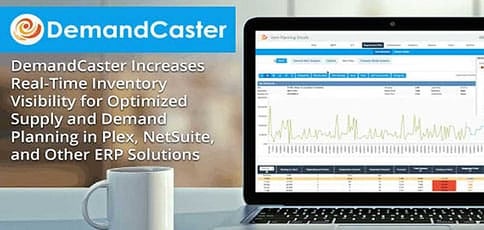
In a Nutshell: As supply chains become more intricate and consumer preferences more varied, inventory management poses a complex challenge. DemandCaster integrates with enterprise resource planning (ERP) solutions and other data sources to make supply and demand forecasting more precise, efficient, and responsive. As a division of Plex Systems, a leading provider of ERP software for manufacturers, DemandCaster leverages the Plex cloud infrastructure to provide enterprise-grade uptime and stability while incorporating cutting-edge analytical and reporting tools that provide real-time forecasting capabilities. And, as optimization efforts extend beyond the supply chain to incorporate customer data from the social web, DemandCaster is there to transform intelligence into insights that improve the bottom line.
As digital transformation continues in retail, companies need precise supply and demand planning to help increase flexibility and responsiveness — while also reducing overstock and out-of-stock situations.
DemandCaster enables retail, distribution, and manufacturing enterprises to forecast customer demand and adjust capacity and inventory to account for those shifts efficiently. It does this by transforming inventory and sales history into real-time supply requirement data optimized in accordance with service level objectives, supplier lead times, and other benchmarks.

Ara Surenian, Founder of DemandCaster, spoke with us about the importance of enterprise supply chain visibility.
“DemandCaster lets enterprise supply chain managers look at demand and supply in concurrence,” said Ara Surenian, Founder of DemandCaster. “And that means better results: reduced inventory waste, improved turnover efficiency, and cost optimization. We use data to mitigate risk in a risky environment.”
DemandCaster, which went to market in 2007, was acquired in 2016 by Plex Systems, a leading provider of ERP software for manufacturers. DemandCaster now operates as a division within Plex, and Ara works as Plex’s Head of Product and Engineering for that division.
The DemandCaster solution was designed to replace spreadsheet-based planning. Using spreadsheets to accurately forecast sales and plan inventory becomes increasingly difficult and time-consuming as a business grows or its supply chain becomes more complex.
“In my previous role in operations consulting, I continually saw folks struggling with their spreadsheets, trying to collect data and figure things out in an increasingly complex planning environment,” Ara said. “We developed DemandCaster as a solution to those problems.”
Demandcaster was also purpose-built for the cloud. At a time when that concept was still new, businesses found benefit in letting DemandCaster handle infrastructure while they accessed their data in real time regardless of location. “Our built-for-cloud functionality has allowed us to scale nicely alongside our customer base,” Ara said.
Accurate, End-to-End Forecasting Regardless of ERP Platform
From the beginning, the DemandCaster team focused on integrating its solution with a variety of ERP providers. The Plex acquisition didn’t change that. For example, many DemandCaster customers use the Oracle-owned NetSuite ERP.
“There are other demand-planning solutions out there that integrate with NetSuite, but there aren’t any that offer our deeper level of functionality,” Ara said. “We have a strength there, and that’s why our NetSuite customers look to us as opposed to others.”
DemandCaster formed a similarly symbiotic relationship with Plex. Because Plex specifically targets the manufacturing sector, however, Plex and NetSuite ERP customers rarely overlap.

“We were able to add capabilities to the Plex solution that Plex didn’t have — very strong manufacturing-centric, forecasting, distribution-requirement, and supply-side-planning capabilities that supplemented Plex’s manufacturing execution capabilities quite well,” Ara said. “We ended up turning a close partnership into an acquisition that made sense for us both.”
As a division within Plex, DemandCaster adds value to Plex’s customers while operating independently to support NetSuite and other ERP clients. “We now have the resources and the cloud expertise to continue to grow and support Plex customers and non-Plex customers alike,” Ara said.
As of 2017, DemandCaster is hosted in the Plex data cloud operations center, a robust enterprise-grade environment that provides 99.998% uptime, greater stability, and superior monitoring while freeing the DemandCaster team to focus on development.
Improving Performance and Profit by Reducing Waste and Uncertainty
Regardless of the platform, DemandCaster delivers game-changing inventory management and optimization. When supply chain relationships get complex, DemandCaster’s flexibility is a particular asset. One DemandCaster client, a leading cosmetics manufacturer, increased its precision through the use of its own customers’ sales data.
“Our client’s retail customers include all the high-end department stores and dedicated cosmetics retailers,” Ara said. “Those retailers have a lot of rich sales data, and, in certain cases, they share that with our client.”
DemandCaster enables the client to generate a sales forecast that incorporates sales data from retail stores.
“We create a sales forecast at the point of sale,” Ara said. “That gets translated into a consumption of their customers’ inventory, and then into a projection as to when the retailer is going to place the next order with our client.”
“That becomes the input to our client’s demand plan, which means they can make adjustments and add promotions and other strategies to create a much more cohesive and predictable set of scenarios,” Ara continued.
Before starting its relationship with DemandCaster, the client had been attempting to predict supply and demand with spreadsheets — a time- and labor-intensive operation.
“Now they have a highly automated way to pull in the data, run calculations, and generate projections,” Ara said.
Another DemandCaster client, STM Brands, which manufacturers accessories for laptops and phones, also relied on spreadsheets to manage inventory costs and movement. Imprecise planning led to excess spending on air freight to ensure goods got to the right place at the right time. The company also lacked insight into market shifts, which led to out-of-date and excess inventory.
“STM now sees what’s going to happen beyond just the short term,” Ara said. “Now it’s able to align its supply based on more precise projections, evaluate errors, and make adjustments. And that, in turn, has improved its performance.”
Mining Intelligence Data to Increase Precision and Responsiveness
Meanwhile, as the retail industry continues to transform, the quest for even greater supply chain precision continues. DemandCaster customers can look to customer intelligence from the social web to increase the predictive value of their forecasts.
“People want to use customer data to evaluate consumer sentiment,” Ara said. “Is there a lot of energy behind this product? Should we increase our buys or ratchet up our procurement in response to something viral happening on the web? And, when that sentiment starts to wane, when do we pull back?”
Mining customer intelligence means extending the concept of end-to-end visibility beyond the transaction.
“Based on conversations, mentions, reviews, and so on, we can evaluate whether businesses have enough buffer inventory to accommodate a sales jump before the next delivery arrives in two weeks. Or whether money will have to be spent to expedite a shipment because the sentiment is strong,” Ara said.
This also helps improve decision-making around new product introductions, enabling more precise product changeovers.
“You can only do that by digging in and understanding what’s going on beyond the four walls of the business,” Ara said. “And, as a division of Plex, we have the platform and capability to do that — and to continue to find new ways to bring competitive advantages to our customers.”
HostingAdvice.com is a free online resource that offers valuable content and comparison services to users. To keep this resource 100% free, we receive compensation from many of the offers listed on the site. Along with key review factors, this compensation may impact how and where products appear across the site (including, for example, the order in which they appear). HostingAdvice.com does not include the entire universe of available offers. Editorial opinions expressed on the site are strictly our own and are not provided, endorsed, or approved by advertisers.
Our site is committed to publishing independent, accurate content guided by strict editorial guidelines. Before articles and reviews are published on our site, they undergo a thorough review process performed by a team of independent editors and subject-matter experts to ensure the content’s accuracy, timeliness, and impartiality. Our editorial team is separate and independent of our site’s advertisers, and the opinions they express on our site are their own. To read more about our team members and their editorial backgrounds, please visit our site’s About page.

